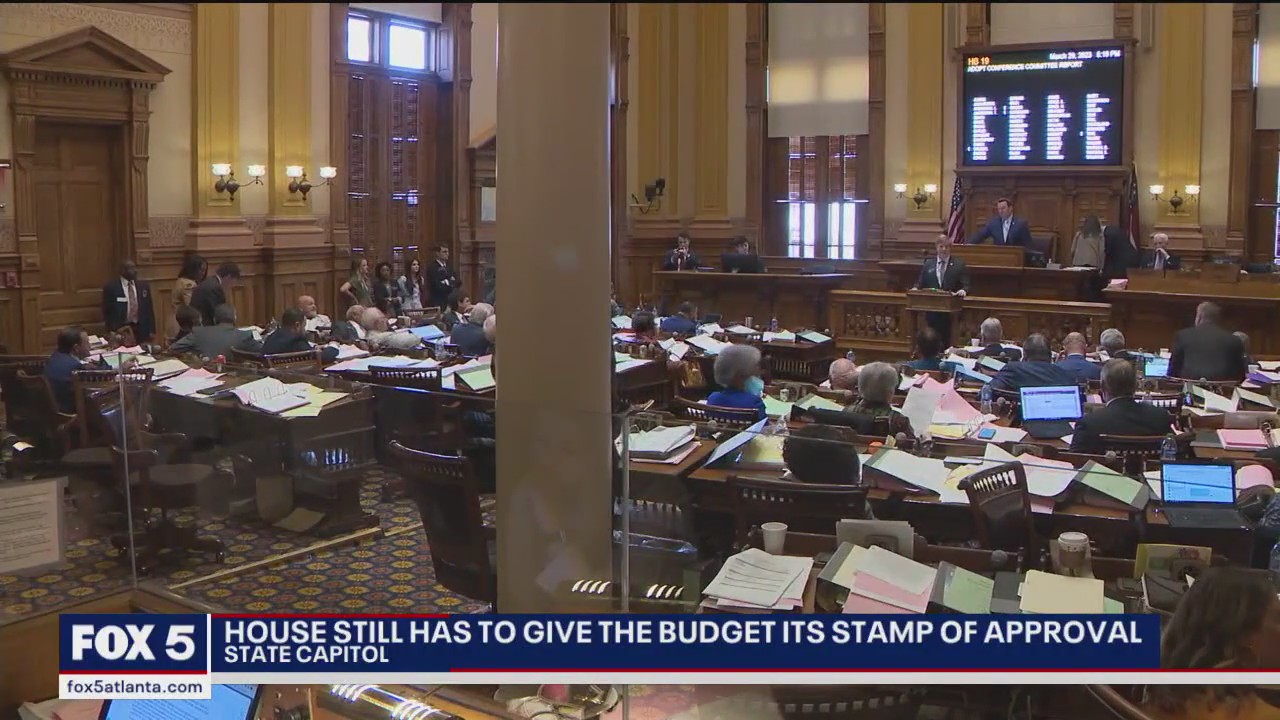What bills passed and did not advance during the 2023 Georgia Legislative Session

Georgia budget compromise
The Georgia House may soon approve a budget compromise offered by the Senate.
ATLANTA - Georgia lawmakers made multiple key decisions Wednesday on the final scheduled day of their 2023 session.
Most important, the General Assembly passed the state budget. Lawmakers also raised the weight limit for some trucks on state roads. Bills that would have improved mental health care and offered vouchers to children attending poorly performing public schools failed to pass.
Some key proposals have already passed, including a bill that would set up a commission to discipline and remove elected prosecutors and bills that seek to improve how reading is taught in Georgia's public schools. Gov. Brian Kemp has already signed a ban on some types of gender-affirming care for transgender people younger than 18, as well as a $1 billion income tax break.
Other measures appear dead for the year, including a bill that would raise the age for filing adult criminal charges against people from 17 to 18 and a bill that would make rioting a felony. But bills can come back to life on the General Assembly's last day. Anything that doesn't pass Wednesday can still be considered in 2024.
Here is a look at some of the issues:
What bills were passed in Georgia this year?
TRUCK WEIGHTS: House Bill 189 would allow trucks carrying logging and farming commodities to weigh more than the current limit of 84,000 pounds.

Georgia House passes bill to discipline prosecutors
The Georgia House voted to create a new state commission to discipline, remove, or forcibly retire district attorneys.
PROSECUTOR OVERSIGHT: Senate Bill 92 would create a commission to discipline or remove district attorneys and county solicitors general.
TRANSGENDER CARE: Senate Bill 140 bans most gender-confirmation surgeries and hormone replacement therapies for those under 18. It would still allow doctors to prescribe medicines to block puberty. Gov. Brian Kemp has signed the bill.
GANGS: Senate Bill 44 would add a mandatory 10 years to prison sentences for anyone convicted of recruiting minors into a gang and make it harder for judges to avoid giving anyone convicted of gang activity at least five more years in prison.
LITERACY INSTRUCTION: House Bill 538 mandates changes to how Georgia students are taught to read, while Senate Bill 211 would create a council to study changes.
HOMELESSNESS: Senate Bill 62 requires localities to enforce bans on homeless people camping in public and say governments and hospitals can't dump homeless people in other counties without permission.
CRIMES AGAINST INFRASTRUCTURE: House Bill 227 would make it a crime to use electronic or physical means to attack systems providing electricity, water, sewer, internet, public transportation, emergency services and health care.
TIK TOK: Senate Bill 93 bans TikTok and some other applications from state-owned computing devices.
ELECTION FUNDING: Senate Bill 222 would make it a felony for local governments to accept money to fund elections from outside groups , except from the state or federal government.
INCOME TAX: House Bill 162 grants a second straight year of state income tax refunds between $250 and $500 for most taxpayers. Kemp has signed the bill.
TAX ON DOWNLOADS: Senate Bill 56 would impose sales tax on books, music, movies, pictures, games and other digital goods bought online, although it would not affect rental or subscription items.
ELECTRIC VEHICLES: Senate Bill 146 allows electric vehicle owners to purchase electricity to charge vehicles by the amount of power used instead of the amount of time spent charging, but with new taxes included.
WELFARE FOR PREGNANT MOMS: House Bill 129 would allow poor pregnant women to seek cash assistance under the state's Temporary Assistance for Needy Families program.
FOSTER CARE: Senate Bill 133 would require juvenile court judges to take additional steps before they could order some children into foster care.
SAFE SCHOOLS: House Bill 147 requires schools to submit their safety plans to the state annually, requires an active shooter drill at each school by Oct. 1 each year and creates a school safety and anti-gang training program for teachers.
TIME OFF TO VOTE: Senate Bill 129 would let employees take time off of work to vote either during early in-person voting or on Election Day.
What bills failed this year in Georgia?
SPORTS BETTING: House Bill 237 would legalize sports betting under the state lottery, without a statewide vote on a constitutional amendment. Tax revenue would flow to college scholarships and state-funded preschool.
ANTISEMITISM: House Bill 144 would create a definition of antisemitism that could be referred to in hate crime prosecutions. Opponents say it would be used to censor criticism of Israel.
VOUCHERS: Senate Bill 233 would give $6,500 educational vouchers to many students that could be used to pay for private school tuition, home schooling or other educational needs.
JUVENILE CRIMES: House Bill 462 would raise the age for filing adult criminal charges against people from 17 to 18 for most crimes.
FELONY RIOT: House Bill 505 would make the crime of rioting a felony instead of a misdemeanor.
BUCKHEAD CITY: Senate Bill 114 would have allowed residents of Atlanta's Buckhead neighborhood to secede from the city of Atlanta and create a new city. The Senate voted it down.
GENDER IDENTITY IN SCHOOLS: Senate Bill 88 would limit how public and private schools and camps could have talked to students about gender identity. A Senate committee tabled it.
OKEFENOKEE PROTECTION: House Bill 71 would bar mining near the Okefenokee Swamp in southeast Georgia. The bill did not advance out of committee.
The Associated Press contributed to this report

